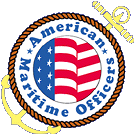
Section Front Front Page |
 |
|
|
| MSP Fully Funded By Congress,
$30 Million Dedicated To Title XI | |||
| In one
of its last acts before adjournment Dec. 15, the 106th Congress
approved full funding for the Maritime Security Program in fiscal
2001 and increased the amount for shipbuilding loan guarantees over
what the President had requested.
The money was included in a House-Senate conference report on appropriations for the Departments of Commerce, Justice and State and the federal judiciary in the fiscal year, which began last Oct. 1. For MSP, the legislation provided $99 million, enough to cover the 47 militarily useful U.S. merchant ships now enrolled in the program. Each of the ships will receive $2.1 million to ease competition with foreign-flag merchant ships in U.S. commercial trade overseas. In exchange for the operating stipends, the ships, their crews, and all intermodal and logistics support equipment owned by participating companies must be made available to the Department of Defense for use during national security emergencies. AMO represents the licensed officers on seven of the 47 vessels enrolled in the program. MSP was authorized for 10 years at a total cost of $1 billion by the Maritime Security Act of 1996. The money must be approved each year as a direct appropriation. For the U.S. ship construction loan and mortgage guarantee program authorized in Title XI of the Merchant Marine Act of 1936 and overseen by the Maritime Administration in the Department of Transportation, the conference report provided $29.9 million--more than what President Clinton had asked for in his 2001 spending request, but less than what many lawmakers and maritime labor and industry observers had agreed would be adequate. The President requested only $2 million in new Title XI authority, while a coalition of unions, vessel operators and shipyards sought a minimum of $50 million to support current shipbuilding projects and pending orders worth an estimated total of $1 billion. "We're pleased that Congress has recognized that the Title XI program is an important component of our nation's maritime policy and has agreed to significantly increase funding levels over those requested by President Clinton in his fiscal year 2001 budget," said Allen Walker, president of the Shipbuilders Council of America and chairman of the Title XI Coalition. "Thanks to the strong Congressional support for this program, $29.9 million in new money will be available to facilitate hundreds of millions of dollars in new ship construction, creating thousands of shipyards and seagoing jobs." But, Walker continued, "even with this increase, funding has reached a historical low." He called on the new administration to recognize Title XI at "a critical juncture," and to propose "sufficient funding levels" to enhance Title XI's "viability." Walker concluded: "While Congress has provided $29.9 million for Title XI, we are still concerned that, without adequate funds in future budgets, many important shipbuilding projects will languish. An important first step next year is for the administration to request an adequate funding level in fiscal year 2002 for Title XI, which we believe should be at least $50 million." Title XI is not a shipbuilding subsidy. Instead, the program makes it easier for U.S.-flag ship interests to obtain and manage commercial credit for fleet expansion and improvement in U.S. shipyards. Each dollar appropriated for Title XI generates an estimated $20 in private financing for such projects. | |||
|